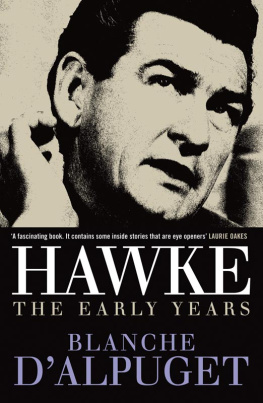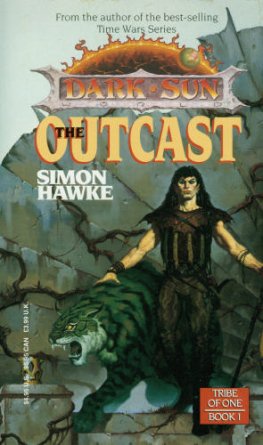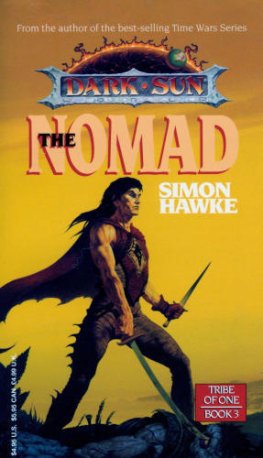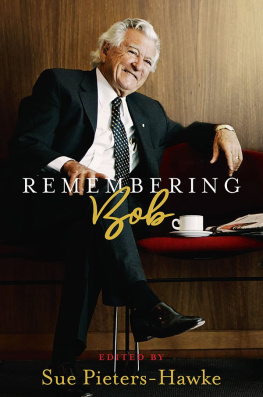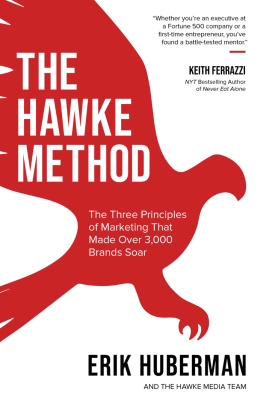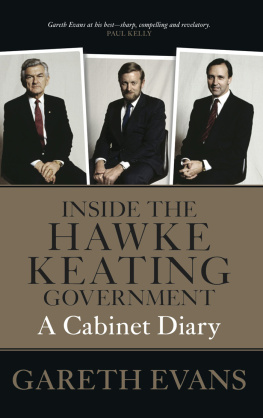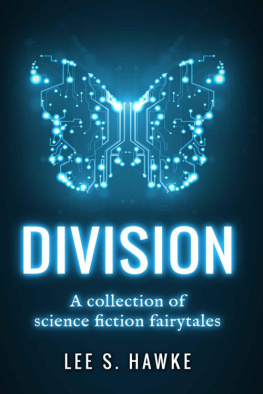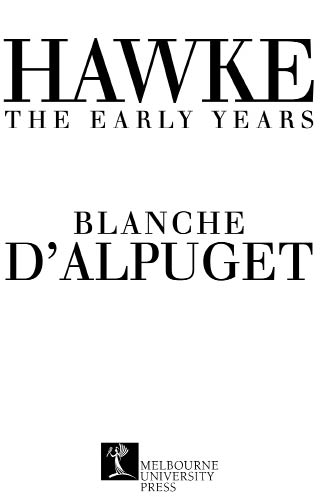Blanche dAlpuget is the author of eight books, including four novels Monkeys in the Dark (1980), Turtle Beach (1981), Winter in Jerusalem (1986) and White Eye (1993). These works won a number of literary prizes including the PEN Golden Jubilee Award, The Age Novel of the Year Award, the South Australian Premiers Award and the Australasian Prize for Commonwealth Literature. dAlpugets Mediator: A Biography of Sir Richard Kirby was published in 1977 to critical acclaim, and Robert J. Hawke: A Biography (1982) was a national bestseller. After a long break, dAlpuget returned to writing with a short work, On Longing , released in 2008, and 2010 saw the release of part two of her biography on Hawke, Hawke: The Prime Minister .
She has served on the boards of the ACT Arts Advisory Council, the Copyright Agency Ltd, the Australian Film Commission and has been the Chair of the Australian Society of Authors. As Austcare Goodwill Ambassador between 1992 and 1996 she wrote of the plight of refugees from Indochina, the former Yugoslavia and Afghanistan. She is a Patron of the Australia China Friendship Society in New South Wales and the Patron of Inala, a Rudolf Steiner organisation catering for people with severe disabilities.
She lives in Sydney with her husband and son.
MELBOURNE UNIVERSITY PRESS
An imprint of Melbourne University Publishing Limited
187 Grattan Street, Carlton, Victoria 3053, Australia
mup-info@unimelb.edu.au
www.mup.com.au
First published in Australia as Robert J. Hawke: A Biography by Schwartz Publishing Group, Melbourne, in conjunction with Lansdowne Press, 1982
This edition first published 2010
Text Blanche dAlpuget, 2010
Design and typography Melbourne University Publishing Limited, 2010
This book is copyright. Apart from any use permitted under the Copyright Act 1968 and subsequent amendments, no part may be reproduced, stored in a retrieval system or transmitted by any means or process whatsoever without the prior written permission of the publishers.
Text design by Phil Campbell
Typeset by TypeSkill
Printed by Griffin Press, South Australia
National Library of Australia Cataloguing-in-Publication entry
DAlpuget, Blanche, 1944
Hawke: the early years / Blanche dAlpuget.
9780522860917
Includes bibliographical references and index.
Hawke, Bob, 1929
Labor unionsAustraliaOfficials and employeesBiography.
Prime MinistersAustraliaBiography.
331.88092

For my father, Lou dAlpuget, with affection
Contents
Preface to the Second Edition
I finished writing this book in May 1982. It first appeared in print in October that year, when Bob Hawke was the shadow Minister for Industrial Relations. At the time members of the Canberra press gallery considered his ambition to become prime minister derisory. Four months later, however, he was master of The Lodge.
By then I was engaged on another project and living abroad but, working from press clippings that my publisher, Morrie Schwartz, hand-carried to Israel for me and from what I already knew as an insider in the Hawke camp, I was able to write an additional few pages to incorporate the historic events of FebruaryMarch 1983. This updated version was published and republished in the 1980s. Now after a gap of a quarter of a century it is the first volume of a two-volume biography. Except for some very minor changes, discernible only to a computer, this volume is the same book that appeared in 1983.
Like most authors I never reread any book Ive written. But being obliged to do so with this one after twenty-five years I was pleasantly surpriseda pleasure I hope old and new readers will share.
Blanche dAlpuget
Sydney, 31 March 2010
Preface to the First Edition
There is a school that holds that biographies of the living should not be written, because they cannot be honest. Indeed, the problems confronting the biographer of a living subject are daunting, especially ifas in the case of R. J. Hawkethe writer knows that much of what she reveals about her subject may be used and misused against him, in his lifetime, perhaps to the detriment of a career that is in mid-term. Such considerations have also concerned Hawke. It is a mark of his candour and integrity that he has permitted me, as an authorised biographer, to write about him critically and often unflatteringly and that, in the tradition of his spiritual ancestor, Cromwell, he is willing to be presented warts and all. The only area I have avoided is a discussion of the Hawke children, whose privacy has already been invaded over many years. I have omitted information about the children at the request of Hazel Hawke. Her desire to protect them, and not to have republished matters that have already appeared in the press, has been a price worth paying for her help and unflinching frankness, both in giving information and in reading the manuscript for accuracy of detail. I have been guided by her perceptions a great deal, while exercising the responsibility to reach my own conclusions.
It is, surely, one of the most unnerving experiences in any life to have the past loom up, made solid in words. When Sir Richard Kirby first read the manuscript of the biography I had written about him, he exclaimed, Oh, God. I feel like a full frontal nude! Hawke made a similar remark in the same situation: This is traumaticlike seeing your face in a mirror with a thousand facets. Some of the images seem to me grotesque.
I have taken the view that there is no single truth to be told about something as complex and shifting as a fifty-year life span, but rather many truths, from various perspectives that, when viewed together, reveal the dimensions of personality. To do this I have had to rely on people who have known Hawke at different stages of his life. Throughout the book I have allowed them to speak for themselves about him, offering opinions that, sometimes, are contradictory but out of which, I think, a coherent pattern emerges.
While the great drawback to biographies of the living or recently dead is the problem of candourand, under Australian law, libelan advantage lies in the wealth of information that may be collected, either from the subject or from those people who have known him or her. Importantly, too, friends, enemies and relations can provide a heavy counterweight to the subjects self-view. In Hawkes case their assistance to me has been crucial, for he is a man of dominating personality and persuasiveness and one, moreover, whose legal training has enabled him to confound critics with dextrous, logical argument. I make no claim to have been able, at all times, to withstand the force of Hawkes self-perceptions, but I have tried to present them as his own, by giving them as transcripts of his descriptions of situations, and where possible, presenting different views. The book is full of voices, for it is largely an oral history.
The use of oral historyin plain language, interviewsovercomes to some extent a major difficulty in writing about twentieth-century lives: lack of documentation. Telephones, radio, television, the whole world of audiovisual technology, has altered us so much: people have abandoned, for example, the custom of committing their intimate thoughts to letters and diaries, the documents that were once the primary source of a biographer. But oral history is only a partial solutionfor what the middle-aged man recalls, let us say, about his parents is, generally, different from what the child, writing a diary, may have thought of them and may have later, unconsciously, built in to his behaviour in reaction to those thoughts. Again, the recollections of people who knew the subject in childhood are an important counterweight.

